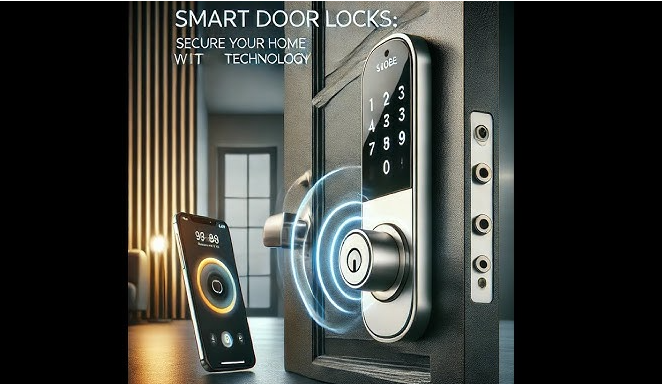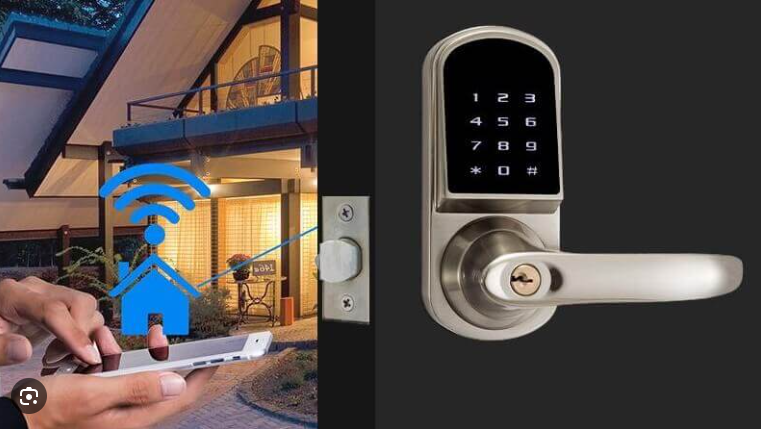As smart locks become a go-to solution for modern home security, many homeowners are asking, “Can smart locks be used on metal doors?” Metal doors, commonly found in homes, apartments, and commercial buildings, offer durability and strength, but their unique properties raise questions about compatibility with smart locks. In this comprehensive guide, we’ll explore whether smart locks can be used on metal doors, the factors to consider for smart lock installation, and how to ensure smart lock safety through proper setup and maintenance. By the end, you’ll have the knowledge to choose and install a smart lock that works seamlessly with your metal door.
Understanding Smart Locks and Metal Doors
Smart locks are advanced locking systems that enable keyless entry through methods like smartphone apps, PIN codes, biometric scans, or voice commands. They use technologies such as Wi-Fi, Bluetooth, Z-Wave, or Zigbee to connect with devices or smart home systems. Unlike traditional locks, smart locks combine mechanical components with digital features, making compatibility with different door types, including metal doors, an important consideration.
Metal doors are typically made of steel, aluminum, or other alloys, offering superior strength and resistance to forced entry. However, their thickness, weight, and construction can affect smart lock installation and performance. The question “Can smart locks be used on metal doors?” depends on factors like door thickness, lock design, and installation requirements. Let’s dive into the details to understand how to make smart locks work effectively on metal doors.

Can Smart Locks Be Used on Metal Doors? Compatibility Factors
The short answer is yes, smart locks can be used on metal doors, but compatibility depends on several factors. Most smart locks are designed to work with standard door types, including metal, wood, and fiberglass, but metal doors present unique challenges. Here’s what you need to consider to ensure a smart lock is compatible with your metal door:
- Door Thickness: Smart locks are typically designed for doors with a standard thickness of 1-3/8 to 1-3/4 inches (35–45 mm). Metal doors, especially in commercial settings, may be thicker (up to 2 inches or more). Check the lock’s specifications to confirm it supports your door’s thickness, or look for models with adjustable or extended latch assemblies.
- Bore Hole Size: Smart locks require a standard 2-1/8-inch (54 mm) bore hole for the lock body and a 1-inch (25 mm) hole for the latch. Most metal doors come pre-drilled with these specifications, but older or custom doors may require drilling or modification.
- Lock Type: Some smart locks replace only the interior portion of the deadbolt (e.g., August locks), while others replace the entire deadbolt assembly (e.g., Schlage or Yale). Ensure the lock’s design is compatible with your metal door’s existing hardware.
- Material Compatibility: Metal doors can sometimes interfere with wireless signals (Wi-Fi, Bluetooth, or Z-Wave), especially if the door is thick or has a solid core. Choose a smart lock with strong connectivity or consider a portable smart lock that doesn’t rely heavily on wireless signals.
- Weather Resistance: Metal doors are often used as exterior doors, exposed to weather conditions. Select a smart lock with a high weather-resistance rating (e.g., IP65) to withstand moisture, heat, or cold.
By verifying these factors, you can confirm that a smart lock is suitable for your metal door. A trusted best smart lock guide can help you identify models designed for metal doors.
Benefits of Using Smart Locks on Metal Doors
Using a smart lock on a metal door offers several advantages, combining the strength of metal with the convenience and security of smart technology:
- Enhanced Security: Metal doors are naturally resistant to forced entry, and pairing them with a smart lock’s advanced features (e.g., encryption, activity logs, and tamper alarms) creates a robust security system.
- Keyless Convenience: Smart locks allow you to unlock your metal door using a smartphone, PIN code, or biometric scan, eliminating the need for physical keys.
- Remote Access: Wi-Fi-enabled smart locks let you lock or unlock your door remotely, ideal for managing access to a metal door in a home or business.
- Smart Home Integration: Many smart locks integrate with systems like Alexa, Google Home, or Apple HomeKit, allowing you to control your metal door as part of a smart home ecosystem.
- Guest Access: Smart locks make it easy to grant temporary access codes for visitors, service providers, or renters, enhancing convenience for metal doors in various settings.
These benefits make smart locks an excellent choice for metal doors, provided you choose a compatible model and follow proper installation practices.
Challenges of Using Smart Locks on Metal Doors
While smart locks can be used on metal doors, there are potential challenges to address to ensure smart lock safety and functionality:
- Signal Interference: Thick metal doors can weaken Wi-Fi or Bluetooth signals, affecting connectivity. Using a Wi-Fi bridge or placing the router closer to the door can help.
- Installation Complexity: Metal doors are harder to drill or modify than wood, so improper smart lock installation can lead to misalignment or damage. Professional installation may be needed for complex setups.
- Battery Life Concerns: Smart locks on exterior metal doors exposed to extreme weather may experience reduced smart lock battery life due to temperature fluctuations. Regular battery checks are essential.
- Compatibility Issues: Not all smart locks are designed for the thicker or heavier construction of some metal doors, particularly in commercial settings.
By addressing these challenges through careful selection and proper smart lock setup, you can ensure your smart lock works reliably on a metal door.
How to Install a Smart Lock on a Metal Door
Proper smart lock installation is critical for ensuring your smart lock works effectively and securely on a metal door. Follow these steps to install your smart lock correctly:
1. Choose a Compatible Smart Lock
Select a smart lock designed for metal doors, with specifications that match your door’s thickness and bore hole size. Check for weather resistance if the door is exterior. A comprehensive smart lock guide can help you find models suited for metal doors.
2. Gather the Right Tools
Installing a smart lock on a metal door may require specialized tools, as metal is harder to work with than wood. Common tools include:
- Screwdriver (Phillips or flathead, as specified by the lock).
- Drill with metal-cutting bits (if modifications are needed).
- Measuring tape and level to ensure proper alignment.
- Lubricant or cleaning solution to prepare the door surface.
3. Verify Door Compatibility
Measure your metal door’s thickness and confirm that the bore holes (2-1/8-inch for the lock body, 1-inch for the latch) are present and correctly aligned. If the door isn’t pre-drilled, consult a professional locksmith, as drilling metal requires precision to avoid damage.
4. Follow the Manufacturer’s Installation Instructions
Each smart lock has specific installation steps, but the general process includes:
- Remove the existing lock (if applicable) using a screwdriver.
- Install the smart lock’s deadbolt and latch, ensuring proper alignment with the strike plate.
- Secure the interior and exterior components of the lock to the door.
- Test the lock’s mechanical operation (using a physical key, if included) before connecting it digitally.
Tip: Metal doors can be unforgiving, so double-check alignment and tighten screws securely to prevent movement.
5. Complete the Smart Lock Setup
After installation, set up the lock’s digital features:
- Connect the smart lock to your smartphone app via Wi-Fi, Bluetooth, or a Z-Wave/Zigbee hub, following the instructions for how to pair a smart lock.
- Use a strong, unique password and enable two-factor authentication (2FA) for the app.
- Connect to a secure Wi-Fi network with WPA3 encryption to enhance smart lock safety.
- Test the lock using the app, keypad, or voice commands (if integrated with a smart assistant).
6. Test and Troubleshoot
After installation, test the lock thoroughly to ensure it locks and unlocks smoothly. If you encounter issues, refer to the manufacturer’s smart lock troubleshooting guide. Common problems on metal doors include misalignment or signal interference, which may require repositioning the lock or adjusting your Wi-Fi setup.
7. Consider Professional Installation
Installing a smart lock on a metal door can be challenging due to the material’s hardness and weight. If you’re unsure about drilling or alignment, hire a professional locksmith to ensure a secure and proper smart lock installation.

Maintaining Your Smart Lock on a Metal Door
To ensure your smart lock remains reliable and secure on a metal door, incorporate these smart lock maintenance practices:
- Monitor Smart Lock Battery Life: Check the battery every 3–6 months, as metal doors exposed to weather may reduce smart lock battery life. Replace batteries promptly when low (most locks use AA or AAA batteries).
- Update Firmware: Regularly update the lock’s firmware via its app to patch security vulnerabilities and improve performance.
- Clean the Lock: Metal doors are prone to rust or debris buildup, especially outdoors. Clean the lock and keypad regularly to prevent mechanical issues.
- Check Alignment: Periodically inspect the lock and door alignment, as metal doors can shift due to temperature changes or heavy use.
- Troubleshoot Issues: If the lock malfunctions, use the manufacturer’s smart lock troubleshooting guide to address issues like connectivity problems or unresponsive controls.
Portable Smart Locks for Metal Doors
For renters or those who prefer a non-permanent solution, a portable smart lock can be an excellent option for metal doors. These locks, such as travel or add-on smart locks, attach to the door without drilling or permanent modifications. They typically use Bluetooth or offline methods (e.g., PIN codes) and are ideal for metal doors in apartments or temporary setups. Ensure the portable lock is compatible with your door’s thickness and has strong security features.
Smart Lock Use Cases for Metal Doors
Smart locks on metal doors are versatile and suitable for various scenarios:
- Homeowners: Pair a smart lock with a metal entry door for enhanced security and remote access, ideal for exterior doors.
- Renters: Use a portable smart lock on a metal apartment door to avoid permanent modifications while enjoying smart features.
- Vacation Rentals: Install a smart lock on a metal door to manage guest access remotely, with temporary codes for convenience.
- Businesses: Commercial-grade smart locks on metal office doors provide secure access control and activity tracking.
Common Myths About Smart Locks on Metal Doors
Several misconceptions about using smart locks on metal doors can cause confusion. Let’s debunk a few:
- Myth: Smart locks don’t work on metal doors. Most smart locks are compatible with metal doors, provided the door meets the lock’s specifications for thickness and bore holes.
- Myth: Metal doors block smart lock signals. While thick metal doors may weaken signals, using a Wi-Fi bridge or hub can ensure reliable connectivity.
- Myth: Installing a smart lock on a metal door is too difficult. With the right tools and instructions, many smart locks can be installed on metal doors, though professional help may be needed for complex setups.
Conclusion: Can Smart Locks Be Used on Metal Doors?
So, can smart locks be used on metal doors? Absolutely, as long as you choose a compatible model and follow proper smart lock installation and smart lock setup practices. Metal doors offer excellent durability, and pairing them with a smart lock enhances security with features like keyless entry, remote access, and activity monitoring. By considering factors like door thickness, signal interference, and weather resistance, and by performing regular smart lock maintenance, you can ensure your smart lock works reliably and securely on a metal door.
For help selecting the right smart lock for your metal door, explore this comprehensive home security tips guide to find models that balance compatibility, security, and convenience.